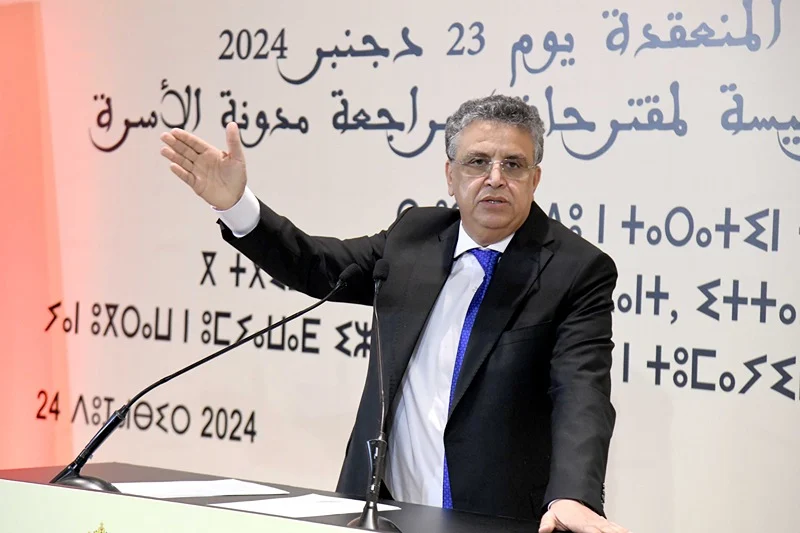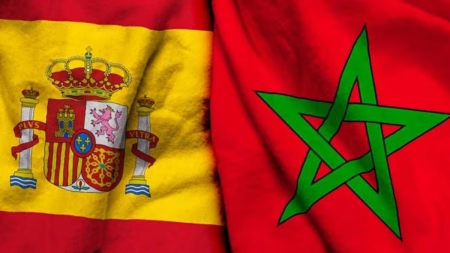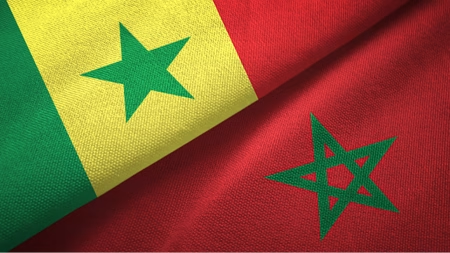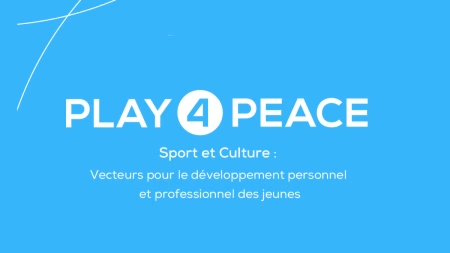In accordance with the directives of His Majesty King Mohammed VI, during the working session presided over by the Sovereign dedicated to the issue of revising the Family Code, Justice Minister Abdellatif Ouahbi presented, on Tuesday 24 december 2024, during a communication meeting in Rabat, the key points of what has been accomplished in terms of revising the Family Code. This followed the completion of the consultation process overseen by the body responsible for reviewing the Family Code, and after the Supreme Council of Ulemas issued its legal opinion on certain proposals from the body related to formal religious texts.
Mr Ouahbi specified that the communication meeting took place within the framework of the High Royal Instructions and His Majesty the King’s desire to continuously ensure the transparency of the Family Code revision process and to guarantee wider communication on this issue.
The justice minister noted that His Majesty the King defined, in his letter to the Head of Government, the methodology of the reform, its areas, and its objectives, and entrusted the supervision of the collective consultation and listening process to an institutional body with a diverse structure, composed of members from the executive and judicial powers, the Supreme Council of Ulemas, and an independent constitutional body responsible for human rights.
He also recalled that the wide consultations and listening sessions organized by the body were supported by all segments of political and civil societies, as well as by scholars, ulemas, and academics, who presented a strong range of proposals, expressing their vision of the Moroccan family, its foundations, resilience, and their concern for safeguarding the superior interests of children, strengthening the position of women, and working towards achieving equality with men, in line with the Constitution and the Kingdom’s constants.
After completing its mission within the set timeframe, the body presented to His Majesty the King a report on its activities in two volumes, the first of which concerns “proposals related to the Family Code” and the second contains “general proposals,” which are not directly linked to the text of the Code but are essential for its optimal implementation. In numbers, the body presented 139 amendment proposals across the seven books of the Code.
On this occasion, Ouahbi explained that His Majesty the King congratulated the members of the body for their competence, objectivity, and dedication in fulfilling their mission, as well as for their contribution to drafting a comprehensive revision of the Family Code. The Sovereign also praised the legal and jurisprudential opinion of the Supreme Council of Ulemas and the role of the body responsible for issuing fatwas in its preparation, in light of the principle that His Majesty the King has continuously reaffirmed, namely that the Commander of the Faithful “cannot authorize the prohibited nor prohibit the authorized.”
Ouahbi further explained that the revision of the Family Code aims to address certain gaps and dysfunctions observed during its judicial application, adapt its provisions to the evolution and dynamics of Moroccan society, meet the requirements of sustainable development, and align it with recent legislative developments, particularly international conventions ratified by the country.
As a result, “we are now facing a substantial revision of the Family Code, which responds to the principles and frameworks defined in the Royal Letter, in accordance with the rules and guidelines it established to develop a new version of the Family Code, capable of accompanying today’s Morocco and the social changes it is undergoing, while scrupulously ensuring that its provisions strengthen the position of women and their rights, protect the rights of children, and preserve the dignity of men,” he said.
Among the points adopted based on the proposals of the body and the opinion of the Supreme Council of Ulemas, the minister particularly mentioned the following:
– First: the possibility of documenting engagements and the consideration of the marriage certificate as the sole proof of marriage as a general rule, while establishing exceptional cases for admitting the action of recognizing marriage, as well as strengthening guarantees for the marriage of persons with disabilities by revising the formal and administrative procedures required for establishing the marriage certificate.
– Second: the possibility for Moroccans living abroad to register their marriage without the presence of two Muslim witnesses if deemed impossible.
– Third: the legal capacity for marriage is acquired at the age of 18 years old (as per the Gregorian calendar), with an exception whereby the legal majority is set at 17 years old, subject to a series of conditions that practically keep it within the “exception” circle.
– Fourth: the obligation to obtain the wife’s opinion during the documentation of the marriage certificate regarding whether the husband commits to renouncing polygamy or not, and to mention this in the certificate. If the condition to renounce polygamy is imposed, the spouse does not have the right thereto to honor this condition. Without this condition, the “exceptional objective justification” for polygamy is limited to cases of infertility of the first wife or illness that prevents marital relations, or other cases left to the judge’s discretion based on well-defined legal criteria deemed equally objective and exceptional.
– Fifth: the creation of a non-judicial body for reconciliation and mediation, whose intervention is initially requested outside of consensual divorce cases, limiting its mission to attempting reconciliation between the spouses and finding common ground regarding the effects of divorce.
– Sixth: consensual divorce will be subject to direct contract between the two spouses without the need for judicial intervention, reducing the types of divorce and repudiation, as the divorce by discord encompasses most cases, and setting a maximum period of six (6) months to resolve divorce and repudiation cases.
– Seventh: a new framework for managing assets acquired during the marital relationship, valuing the wife’s work within the household as a contribution to the development of assets acquired during the marriage.
– Eighth: the adoption of modern electronic means for notifications in divorce and repudiation cases, with the acceptance of proxy in these cases, except during the reconciliation and mediation period.
– Ninth: considering child custody as a shared right between both spouses during the marriage, with the possibility of extending it, if agreed, after the breakdown of the relationship, and strengthening the child’s right to housing under guardianship, in addition to establishing new rules governing the child’s visitation or relocation.
– Tenth: the preservation of the divorced mother’s right to custody of her children, even in case of remarriage.
– Eleventh: the establishment of reference standards for estimating Nafaqa (alimony and child support), along with procedural mechanisms to expedite the notification and execution of corresponding judgments.
– Twelfth: making “legal representation” common to both spouses during and after the dissolution of the marriage. In cases where there is no agreement between the spouses on the matter, the family judge will intervene to resolve the dispute within the criteria and objectives defined by law.
– Thirteenth: The determination of the legal procedures the court must follow to grant emancipation to a minor, strengthen the legal protection of their assets, and subject the actions of their legal, testamentary, or appointed guardians to judicial control.
– Fourteenth: the right of the husband or wife to retain the marital home in the event of the spouse’s death, under the conditions set by law.
– Fifteenth: the adoption of the proposal from the Supreme Council of Ulemas regarding the “inheritance of daughters,” recommending that anyone may, during their lifetime, donate part of their assets to heirs, replacing derivative possession with actual possession.
– Sixteenth: opening the possibility of wills (Wassiya) and donations (Hiba) for both spouses in the case of differing religions.
Ouahbi also noted that since this is a profound revision of the Family Code, a formulation will be adopted with modern expressions, replacing certain terms that have become obsolete in our legal and judicial system.
As for the general proposals aimed at supporting this reform, the minister explained that they mainly involve:
– First: mobilizing qualified and sufficient human resources, including judges and executives, to manage family matters, while providing them with continuous specialized training.
– Second: reviewing procedures and measures related to family law, while establishing a practical guide and reference for the Family Code.
– Third: facilitating access to family justice by creating a “one-stop shop” in family courts.
– Fourth: raising awareness among future spouses about the rights and obligations derived from marriage, while adopting a public policy to support this issue.
– Fifth: studying the possibility of creating a national registry to register marriage and divorce certificates.
Ouahbi also emphasized that, in supervising all stages of this reform, His Majesty the King ensured it was imbued with the virtues of participation and ownership, establishing a constructive framework that integrates the contributions of all, each from their own position, to promote the objectives of renewal, development, and Ijtihad, as expressed by the Family Code during its drafting in 2004 and the favorable response it generated both nationally and internationally. This underscores the distinguished character of the reform methodology adopted by the Kingdom, based on consistency, gradualism, capitalization, and moderation of its religious reference framework, as well as the capacity of Ijtihad tools to reconcile the objectives of Sharia with the progress made in terms of rights and freedoms.
Thus, the minister concluded, the High Instructions of His Majesty the King, addressed to the Head of Government and the ministers involved in the revision of the Family Code, emphasized in the Royal Office’s statement the need for this spirit to continue in the project’s drafting, its debate, and its approval by Parliament, with the goal of adopting a new version of the Code that capitalizes on the achievements of the previous version, supports them, and revises its dysfunctional points. The common goal is to achieve family equality and balance and enshrine the principles of justice, equity, solidarity, and cohesion, with the support of all and the recognized spirit of patriotism, to contribute a new stone to the consolidation of the rule of law and the building of a democratic society, led with will and determination by His Majesty King Mohammed VI.












